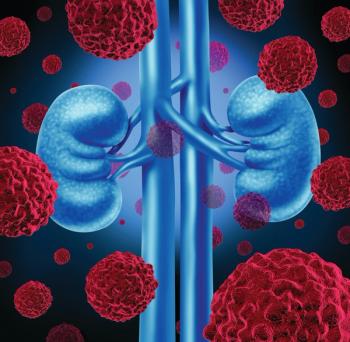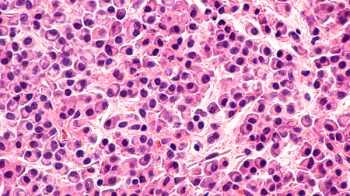
New research presented at the American Society of Clinical Oncology 2021 annual meeting has found encouraging results with the use of 177Lu-PSMA-617 in patients with advanced prostate cancer.

New research presented at the American Society of Clinical Oncology 2021 annual meeting has found encouraging results with the use of 177Lu-PSMA-617 in patients with advanced prostate cancer.

Andrea Apolo, MD, a Lasker clinical research scholar and head of the Bladder Cancer Section at the National Cancer Institute, detailed some of the AEs experienced by patients with aRCC who were given either nivolumab plus cabozantinib or sunitinib.

Results from the phase 3 TITAN study shows a combination therapy that includes apalutamide may achieve survival benefit without significant burden of adverse effects.

Andrea Apolo, MD, a Lasker clinical research scholar and head of the Bladder Cancer Section at the National Cancer Institute, explained how the phase 3 CheckMate 9ER trial was conducted in order to assess the outcomes by baseline disease characteristics for patients with aRCC.

Andrea Apolo, MD, a Lasker clinical research scholar and head of the Bladder Cancer Section at the National Cancer Institute, discusses her presentation on nivolumab plus cabozantinib versus sunitinib for aRCC.


Study suggests that 8 out of 10 patients with breast cancer who receive treatment with TARGIT-IORT will not need a long course of post-operative external beam radiotherapy.

Frequent prostate-specific antigen screenings may lower the risk of metastasis at the time of diagnosis and lower mortality risk from prostate cancer among younger African American men.

Rates of death among patients with breast cancer due to any cause were 31% higher in states with Medicaid income eligibility limits no greater than 50% of the federal poverty level.


Lung cancer, the most common cancer type with the highest mortality, can largely be categorized by the genetic mutations that cause it.

This is the first and only oncology immunotherapy to show positive phase 3 results in the adjuvant lung cancer setting.

A recent article from the American Cancer Society reports a mixed picture, with historic lows in smoking prevalence but suboptimal obesity, cancer screening, and HPV vaccination levels.

The legislation would require that patients with cancer have access to oral oncology drugs within 72 hours of having the prescription submitted to the patient’s pharmacy benefits manager.

Incidence rates of early-onset colorectal cancer in the United States have increased from 8.6 to 13.1 per 100,000 between 1992 and 2013, with most of this increase attributable to early-onset cancers of the rectum.

Other HPV-associated cancers were found to have increased over the study period, linking this trend to lack of guidelines and other resources.

Inhibiting Toll-like receptor 4 stopped it from accumulating cisplatin, thereby halting the hearing damage caused by the cancer treatment.

Selinexor in combination with bortezomib and dexamethasone is used for adult patients with multiple myeloma who have received at least 1 prior therapy.

Breast cancer patients with low or absent MLH1 or PMS2 gene expression may have even greater risks of death.

This discovery could enhance efforts to develop better treatments for breast, ovarian, and prostate cancer.

The basal subtype of ductal adenocarcinoma can be identified by the presence of the DeltaNp63 protein.

Program participants had 55% fewer hospitalizations, 45% fewer emergency department visits, and shorter hospital stays by 1 day in the 30 days after study entry.

The objective of the study was to determine whether atezolizumab could also be efficacious for patients with earlier-stage disease who may be at risk of disease recurrence following surgery

Physical changes to DNA may contribute to greater inflammation and fatigue for these individuals.

The study authors sought to examine the risks of subsequent primary cancers (SPCs) among breast cancer survivors by HR status and age at diagnosis.

In a trial of amivantamab-vmjw, investigators found an overall response rate of 40% among patients with non-small cell lung cancer whose tumors have epidermal growth factor receptor exon 20 insertion mutations.

Ssatuximab (Sarclisa, Sanofi) is used in combination with carfilzomib and dexamethasone for patients with relapsed or refractory multiple myeloma.

The investigators found that using the vaccine in combination with an immune checkpoint inhibitor—an established immunotherapy drug with a 20% success rate overall for patients—can vastly improve the proportion of individuals who respond to treatments, eliminating tumors in 75% of cases in mice.

Addition of atezolizumab and durvalumab to chemotherapy is a win for patients with extensive-stage small cell lung cancer

The safety profile for the combination treatment remained consistent with previously reported data in NSCLC and was deemed manageable with established protocols with no new safety signals identified.